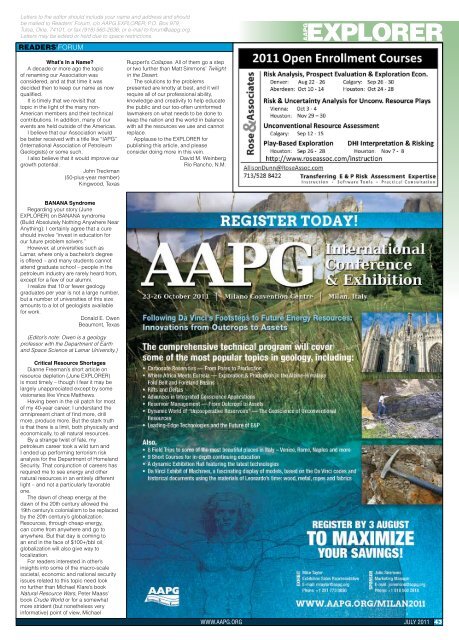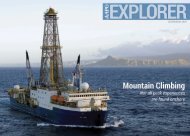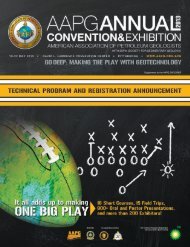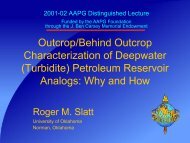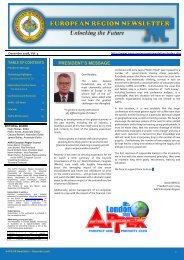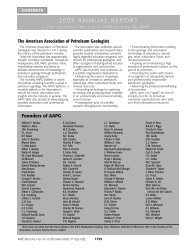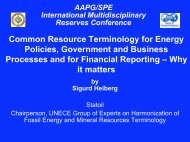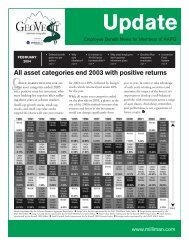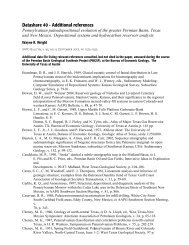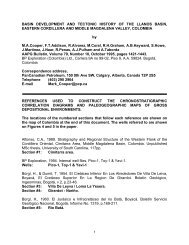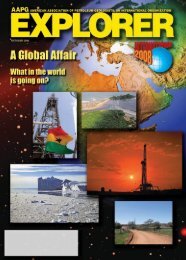AAPG Explorer - American Association of Petroleum Geologists
AAPG Explorer - American Association of Petroleum Geologists
AAPG Explorer - American Association of Petroleum Geologists
Create successful ePaper yourself
Turn your PDF publications into a flip-book with our unique Google optimized e-Paper software.
Letters to the editor should include your name and address and should<br />
be mailed to Readers’ Forum, c/o <strong>AAPG</strong> EXPLORER, P.O. Box 979,<br />
Tulsa, Okla. 74101, or fax (918) 560-2636; or e-mail to forum@aapg.org.<br />
Letters may be edited or held due to space restrictions.<br />
READERS’FORUM<br />
What’s In a Name?<br />
A decade or more ago the topic<br />
<strong>of</strong> renaming our <strong>Association</strong> was<br />
considered, and at that time it was<br />
decided then to keep our name as now<br />
qualified.<br />
It is timely that we revisit that<br />
topic in the light <strong>of</strong> the many non-<br />
<strong>American</strong> members and their technical<br />
contributions. In addition, many <strong>of</strong> our<br />
events are held outside <strong>of</strong> the Americas.<br />
I believe that our <strong>Association</strong> would<br />
be better received with a title like “IAPG”<br />
(International <strong>Association</strong> <strong>of</strong> <strong>Petroleum</strong><br />
<strong>Geologists</strong>) or some such.<br />
I also believe that it would improve our<br />
growth potential.<br />
John Treckman<br />
(50-plus-year member)<br />
Kingwood, Texas<br />
BANANA Syndrome<br />
Regarding your story (June<br />
EXPLORER) on BANANA syndrome<br />
(Build Absolutely Nothing Anywhere Near<br />
Anything): I certainly agree that a cure<br />
should involve “invest in education for<br />
our future problem solvers.”<br />
However, at universities such as<br />
Lamar, where only a bachelor’s degree<br />
is <strong>of</strong>fered – and many students cannot<br />
attend graduate school – people in the<br />
petroleum industry are rarely heard from,<br />
except for a few <strong>of</strong> our alumni.<br />
I realize that 10 or fewer geology<br />
graduates per year is not a large number,<br />
but a number <strong>of</strong> universities <strong>of</strong> this size<br />
amounts to a lot <strong>of</strong> geologists available<br />
for work.<br />
Donald E. Owen<br />
Beaumont, Texas<br />
(Editor’s note: Owen is a geology<br />
pr<strong>of</strong>essor with the Department <strong>of</strong> Earth<br />
and Space Science at Lamar University.)<br />
Critical Resource Shortages<br />
Dianne Freeman’s short article on<br />
resource depletion (June EXPLORER)<br />
is most timely – though I fear it may be<br />
largely unappreciated except by some<br />
visionaries like Vince Matthews.<br />
Having been in the oil patch for most<br />
<strong>of</strong> my 40-year career, I understand the<br />
omnipresent chant <strong>of</strong> find more, drill<br />
more, produce more. But the stark truth<br />
is that there is a limit, both physically and<br />
economically, to all natural resources.<br />
By a strange twist <strong>of</strong> fate, my<br />
petroleum career took a wild turn and<br />
I ended up performing terrorism risk<br />
analysis for the Department <strong>of</strong> Homeland<br />
Security. That conjunction <strong>of</strong> careers has<br />
required me to see energy and other<br />
natural resources in an entirely different<br />
light – and not a particularly favorable<br />
one.<br />
The dawn <strong>of</strong> cheap energy at the<br />
dawn <strong>of</strong> the 20th century allowed the<br />
19th century’s colonialism to be replaced<br />
by the 20th century’s globalization.<br />
Resources, through cheap energy,<br />
can come from anywhere and go to<br />
anywhere. But that day is coming to<br />
an end in the face <strong>of</strong> $100+/bbl oil;<br />
globalization will also give way to<br />
localization.<br />
For readers interested in other’s<br />
insights into some <strong>of</strong> the macro-scale<br />
societal, economic and national security<br />
issues related to this topic need look<br />
no further than Michael Klare’s book<br />
Natural Resource Wars, Peter Maass’<br />
book Crude World or for a somewhat<br />
more strident (but nonetheless very<br />
informative) point <strong>of</strong> view, Michael<br />
Ruppert’s Collapse. All <strong>of</strong> them go a step<br />
or two further than Matt Simmons’ Twilight<br />
in the Desert.<br />
The solutions to the problems<br />
presented are knotty at best, and it will<br />
require all <strong>of</strong> our pr<strong>of</strong>essional ability,<br />
knowledge and creativity to help educate<br />
the public and our too-<strong>of</strong>ten uninformed<br />
lawmakers on what needs to be done to<br />
keep the nation and the world in balance<br />
with all the resources we use and cannot<br />
replace.<br />
Applause to the EXPLORER for<br />
publishing this article, and please<br />
consider doing more in this vein.<br />
David M. Weinberg<br />
Rio Rancho, N.M.<br />
<strong>AAPG</strong><br />
EXPLORER<br />
WWW.<strong>AAPG</strong>.ORG JULY 2011<br />
43


